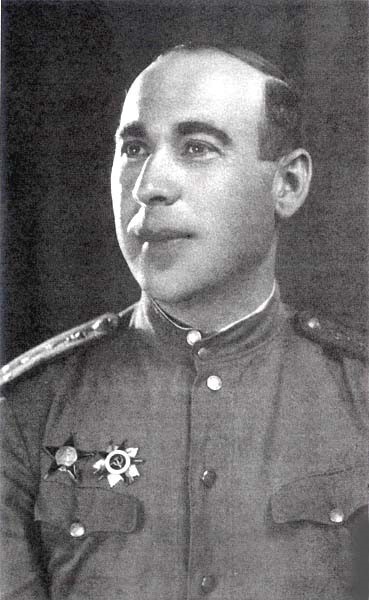Lazar Feldman was born in 1909 in Brest-Litovsk (present-day Brest, Belarus), into a religious family. His father, Moyshe, was a cobbler. Recalling him later, Lazar would remark that Moyshe used to spend more time at the synagogue than in his workshop. As a result, the family was poor, and his childhood was hungry. Nevertheless, Lazar was a strong boy who could defend himself in a fight. During World War I, the family moved to Kharkov, eastern Ukraine. The father attempted to make Lazar his apprentice, but Lazar hated the cobbler's trade, and, upon graduating from a Russian-language school, he found work at the local operetta theater, taking part in crowd scenes. Lazar later recalled the first (and last) visit of his father to the operetta theater.
"They staged Die Bajadere by Emmerich Kálmán. There was a merry overture, and the curtain slowly floated upwards. With bated breath, [I] was watching my father through a hole in the scenery. Appetizing bayaderes in risqué costumes stepped onto the stage. A round of applause. Suddenly, the click of a reclining chair, loud as a shot, and [I] was horrified to see Moyshe angrily gesturing as he walked towards the exit. When I returned home, there was a stormy family scene, with dialogue in Yiddish mixed with Ukrainian, and my father punctuated his speech with swings of his belt. He was terribly indignant at [me], shouting that I was worse than the lowest goy, since I could lure him – a Jew and the gabbay of the synagogue – into that den of iniquity, where dissolute and shameless women exposed their bare legs to the public ..."1
This was the last straw for Lazar. A short while later, he left Kharkov for Leningrad (present-day St. Petersburg, Russia), where he was to live for the next sixty years, except for a long break in 1941-47 for the Soviet-German war and postwar service – and another break in 1947-57, for a GULAG sentence and its aftermath. In Leningrad, Lazar graduated from a medical institute as a dentist.
In June 1941, the Soviet-German war began, and Lazar volunteered for the People's Militia. A short time later, he was transferred to the regular army, to the Leningrad Front, as a medical orderly (feldsher) and dentist. His specialty was dentistry and facial surgery. Service at the Leningrad Front meant that he could pay occasional visits to his family (wife and three children) in Leningrad and support them with food, which was vital for the inhabitants of the besieged city. Later, Captain of Medical Service Feldman was transferred to a front-level hospital (ORMU-52) on the Karelian Front as the head of the department of maxillofacial surgery. In 1944, he was reassigned to the rear hospital of the 3rd Ukrainian Front in the same rank. He took part in military operations in Western Ukraine and Hungary, and in the capture of Vienna. After the war, he continued his service as the chief dentist of the Red Army group in Austria, and was even able to bring his family to this country.
Over the course of the war, Lazar Feldman received two awards: the Red Star and the Order of the Patriotic War, 2nd class. He was never wounded.
In 1947, Lazar smuggled two Jewish families into Hungary. Someone denounced him, and, in December 1947, he was arrested. After a year of "investigation", he was sent to a GULAG camp in northern Russia. Lazar's profession saved his life yet again: being the only dentist in the area, he was spared the heavy logging work. Following the death of Stalin in 1953, Lazar Feldman was "pardoned". Despite his release, the local authorities did not permit him to go to Leningrad: he was to treat the top brass. Lazar returned home only in 1957, full of bitterness and resentment toward the Soviet regime. He drank and spent a lot of time at the synagogue, where he would complain to his interlocutors about the injustice done to him. There followed a twenty-year-long struggle for rehabilitation, and only in the late 1970s did the authorities admit that there had been a miscarriage of justice in his case. His military awards were then returned to him.
In 1991, he moved to Dortmund, Germany, and died there in 1996.







